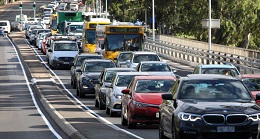26 August 2019
 Rail commuters, take a bow. By catching the train instead of driving, your environmental footprint is five times less that of a typical motorist. If you’re walking or cycling, you get full marks for a zero imprint on the environment.
Rail commuters, take a bow. By catching the train instead of driving, your environmental footprint is five times less that of a typical motorist. If you’re walking or cycling, you get full marks for a zero imprint on the environment.
Statistics don’t lie, and according to a recent study from the University of South Australia (UniSA), plenty of us are not ‘walking the talk’ when it comes to the environment.
Despite 59 per cent of Australians believing we should be doing more to protect the environment, only 12 per cent of people commute to work by public transport, cycling or walking, UniSA researchers have found.
Senior Lecturer Dr Sekhar Somenahalli and his Masters’ student Callum Sleep from UniSA’s School of Natural and Built Environments have just completed a project looking at current travel modes, commuter priorities and how to shift travel behaviour from private vehicles to public transport.
They surveyed residents in six inner and outer Adelaide suburbs, asking them about their transport habits, travel preferences and hypothetical choices of other possible commuting options.
The key findings of his research were:
- Total travel time is the main priority for people, with cost coming a close second;
- People would rather drive a car to an interchange than walk to a nearby bus stop;
- 40% of people living in outer suburbs are willing to use public transport at interchanges if they are well connected by shuttle services;
- A large percentage of people want existing parking areas expanded.
“In Australia, the car population is growing faster than the human population, with more than 90 per cent of Australians living in households with access to a car,” Dr Somenahalli says.
“Road congestion is increasing, yet bus patronage remains low, so we have to find a way to convert as many car users as possible to public transport so we can alleviate congestion and help the environment.”
Dr Somenahalli’s research shows that trains and trams offer the best savings for the environment, with greenhouse gas emissions as much as five times less than those from cars.
His project, funded by the Low Carbon Living CRC, found that Australian commuters were strongly opposed to public transport that required a transfer, listing this as a major deterrent. In Adelaide, 71 per cent of trips don’t involve any transfers, but they still account for only 10 per cent of work commutes.
Dr Somenahalli says it is not enough to simply provide a better public transport service. To encourage people to take trains and buses, the services must be fast, reliable and frequent and coupled with a congestion tax on private vehicles or a hike in parking charges.
Overseas research from the Netherlands suggests that if a public transit trip has a total door-to-door travel time of not more than 1.5 times that of driving then it becomes appealing.
“When public transport is actually quicker than driving – as is the case with the O’Bahn in north-eastern Adelaide and the southern rail corridor in Perth – the results have been outstanding, vastly exceeding all expectations.”
Flexibility and costs are also major factors in getting people to shift from cars to public transport, the study found.
Forty per cent of the respondents said they would use public transport if they could be driven to a station or interchange by a taxi or Uber for under $2.50, removing the need for a car. An additional 15 per cent said they would use such a service if it was free and included as a transfer on their Metro Card.
“There are many ways to make public transport more appealing,” Dr Somenahalli says. “More effective park-and-ride systems, better cycling routes that link to interchanges and high-frequency feeder bus services should all be considered in the mix.”
The Greening Urban and Suburban Travel project is available at http://bit.ly/2Mrc9Pj
Media contact: Candy Gibson office +61 8 8302 0961 mobile: +61 434 605 142
email: candy.gibson@unisa.edu.au
Lead researcher:Dr Sekhar Somenahalli office+61 8 8302 1855 mobile: 0412 225 354
email: Sekhar.Somenahalli@unisa.edu.au


